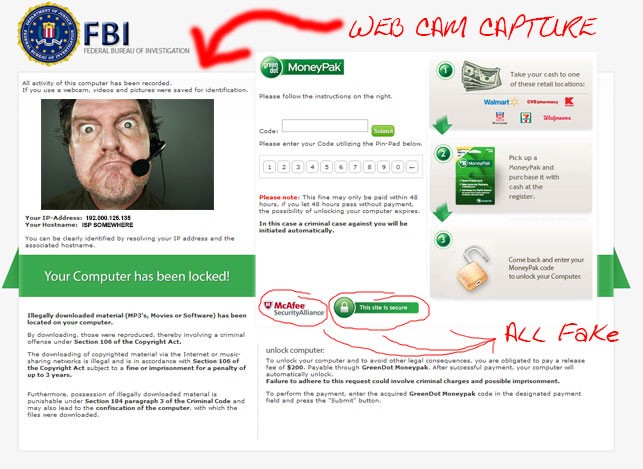He said what?! (FBI Moneypak Ransomware - Virus)

Held for Ransom: He Said What!??
So you’re sitting there, innocently using your computer, when a window flashes on the screen, bearing the logo of the FBI. You have been locked out of your computer for breaking some not too specific copyright law or some other crime. The solution on the screen? Pay a fine to the “FBI” to “unlock” your computer and we won’t kill your first born. Yikes!…but we may actually take your photo as proof that you’ve done something wrong and you will have to pay us (conveniently) via MoneyPak at your local shopping hangouts like Walgreens, CVS, 7-Eleven, or Walmart.
Think this is a new way for the FBI to deal with computer crime? Think again – you have just been a victim of a nasty virus. This is Ransom Software (Ransomware) and it’s disguised in many ways.
Within the last few weeks we received a call from an individual who became a victim. Here’s the scary part: The customer called his internet provider (all shall remain unidentified) and he spoke with a live person. After telling the customer support operator what occurred and hoping for a way to fix the problem he heard something quite disturbing: “Just pay it”, the male operator replied. Come again?!? He said WHAT? This is when our customer called us and told us what happened.
This is one for the record books, people. Why customer support would ever tell someone to pay something that has no part of the services they provide is beyond me. I would also like to think an Internet Service Provider would be up to date on the latest threats but please NEVER, EVER fall for this Ransom scam. Law enforcement agencies in the United States do not issue fines and disable computers without due process – meaning you have a legal means to defend yourself. Plus, we are pretty confident the FBI would never take payments, especially payments from only one specific brand of money card (even if it is widely available at your local convenience store). Tickets, fines, restitution, and other ‘bills’ are typically paid to a court, and only after being notified by a letter or subpoena.
What the FBI VIRUS looks like:
What to do if you are a victim of any kind of virus or ‘ransomware’:
- First off, don’t panic. We know it’s scary. (Fear is a mother!)
- If you are EVER asked to enter a form of payment, credit card, or personal information into any web window you did not specifically request, do not do so.
- If you have already paid (or somehow manage to bypass the lock), you’re not out the woods yet. There may still be malware running on your computer that can impact your privacy or security. Contact Credo Technology Group, LLC immediately so we can take down the FBI (well, take down the FBI ransomware, anyway.)

